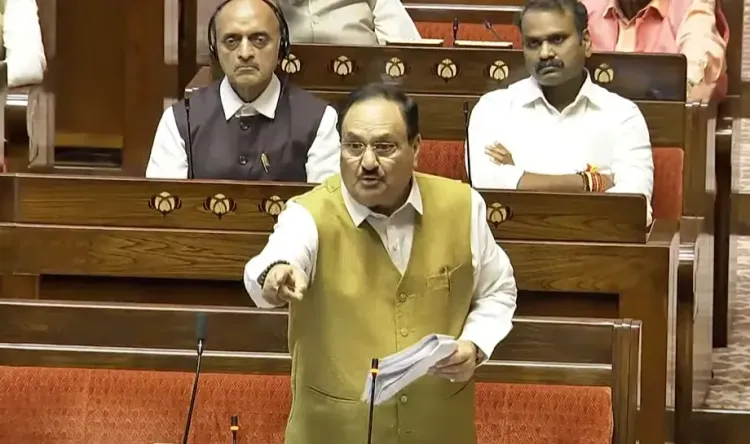5,970 Government Properties, Including Lakes, Designated as Waqf Assets Over the Years: J.P. Nadda

Synopsis
Key Takeaways
- 5,970 government properties declared as Waqf assets.
- Significant misuse of Waqf provisions highlighted.
- New Bill protects tribal interests in designated areas.
- Waqf Boards manage 8.7 lakh properties across India.
- Concerns over pending cases and lack of judicial oversight.
New Delhi, April 3 (NationPress) Emphasizing transparency and accountability as fundamental principles of the Waqf (Amendment) Bill, 2024, the Leader of Rajya Sabha and Union Minister J.P. Nadda stated on Thursday that throughout the years, 5,970 government properties have been designated as Waqf assets due to the misapplication of the current law.
During the discussion on the Bill, J.P. Nadda expressed concern and called for a discussion across party lines regarding how government properties, including lakes, became Waqf properties.
Presenting data gathered from 25 states and Union Territories until September 2024, the Union Minister noted that out of the 108 properties governed by the Ministry of Housing and Urban Affairs and 130 under the Delhi Development Authority, 123 properties have been publicly declared as Waqf properties – indicating a significant misuse of Waqf provisions.
Discussing the alleged conversion of public assets into Waqf holdings in Karnataka, the Leader of the House revealed that between 1975 and 2020, 40 government properties including lakes, farmland, and temples, were designated as Waqf properties.
He emphasized that the new Bill protects the interests of tribal communities by stating that properties located in areas covered under the Sixth Schedule of the Constitution – which pertains to tribal zones in Assam, Meghalaya, Tripura, and Mizoram – cannot be categorized as Waqf properties.
A government report reveals that Waqf Boards currently oversee 8.7 lakh properties encompassing 9.4 lakh acres across India, valued at an estimated 1.2 lakh crores. India holds the largest Waqf holdings globally, with the Waqf Board being the second-largest landowner in the nation after the Armed Forces and Indian Railways.
There are 3,56,051 Waqf Estates registered with the Waqf Board, in addition to 8,72,328 immovable properties and 16,713 movable properties. The Board has so far digitized 3,30,000 records.
Regarding pending cases with the Waqf Administration, the Ministry of Minority Affairs has evaluated the operations of Tribunals and found that there are 40,951 cases pending, of which 9,942 cases were filed by the Muslim community against the institutions managing Waqf.
Furthermore, there has been a significant delay in case resolutions, and there is no provision for judicial oversight on tribunal decisions, it stated.










